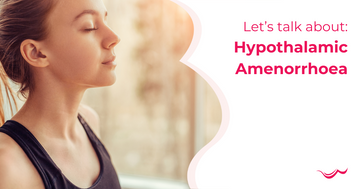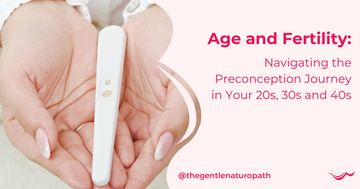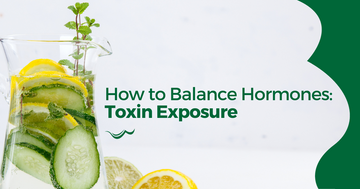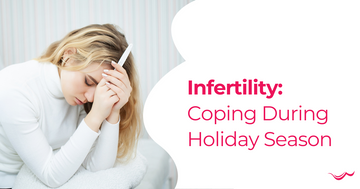No Period? You Could Have Hypothalamic Amenorrhoea
by Nikki Warren on Apr 23, 2024

What is hypothalamic amenorrhoea?
Amenorrhoea is the absence of three or more periods in a row.
There are many different types of amenorrhoea. Hypothalamic amenorrhoea is a type of secondary amenorrhoea that is commonly associated with low body weight in women.
Hypothalamic amenorrhoea (HA) occurs when a small, but very important part of the brain called the hypothalamus stops releasing gonadotropin-releasing-hormone. This hormone sends a message to the pituitary gland to produce hormones such as follicle stimulating hormone and luteinising hormone which in turn send a message to the ovaries, influencing the menstrual cycle.
The hypothalamus doesn’t act alone, it needs information from the outside world and from our body before it tells other organs what to do. Therefore, there are many reasons for the hypothalamus to stop sending these chemical messages.
- High stress levels
- Poor nutrition
- Low body fat
- Overexercising
- Undereating
A combination of the above is often what causes the hypothalamus to enter ‘survival mode’. This means turning off all non-life preserving functions, including reproduction. This is what leads to absent periods.
Undereating and undernutrition
As mentioned, there are many factors that contribute to HA. Undereating, restricting foods and food groups and undernutrition are just some.
Undereating creates an energy deficit in the body. This means that you are expending more energy than you are taking in. This causes the body to burn stored energy for fuel to keep your organs functioning. The body naturally perceives this as starvation, which is a threat to pregnancy, and therefore, the hypothalamus halts reproduction.
Restricting certain foods and food groups can also be problematic regarding menstrual cycle health. Optimal fat intake is essential for the production and function of healthy hormones. Limiting fat in the diet can be problematic for hormone production and contribute to HA.
Cortisol levels – how this affects women’s health and hypothalamic amenorrhoea
Chronic stress has hugely negative impacts on your menstrual cycle. Stress is an unavoidable part of life. When stress becomes chronic, this leads to high levels of cortisol being released from the adrenal glands. When cortisol levels are high, especially for prolonged periods of time, this causes a disruption in communication between the hypothalamus and the ovaries. Similar to how undereating can lead to HA, chronic stress has similar effects.
Stress is often multifactorial. We know it’s hard to avoid stress completely. Most women are juggling families, work, relationships, and finances – that’s a lot! There are things you can and should be doing to manage your stress levels if you are experiencing HA. It doesn’t have to be huge. Things like taking a 10-minute walk on your lunch break, doing 2 minutes of breathing exercises before a meal, journalling or meditation are all great. Find what works for you 😊
Long term: bone health, fertility
Hypothalamic amenorrhoea can have short term effects on fertility. When hypothalamic communication to the ovaries slows or stops, the ovaries fail to produce essential hormones like oestrogen. This results in failure to ovulate. If HA continues, this can negatively impact fertility.
Not only does HA itself negatively affect fertility, but the associated stress does too. HA is perceived by the body and brain as a major stressor. Preconception stress levels of both mum and dad can have negative impacts on time to conceive.
Other long-term effects of HA can include loss of bone mineral density, and in severe cases, osteoporosis. The younger a woman is when she develops HA, the higher risk of bone loss. Peak bone mass is achieved before the age of 30. Hormones, such as oestrogen, have a positive effect on bone mass and bone formation.
Treatment
Here’s the great news, hypothalamic amenorrhoea is reversible. It may take a few months to fully restore a normal menstrual cycle, but it is possible. Treatment for hypothalamic amenorrhoea usually involves restoring weight, increasing energy intake and stress management.
Herbal medicine, especially Chaste Tree and the combination of Dong Quai, Peony and Licorice, can help to restore a regular menstrual cycle.
If low oestrogen is an issue, herbs such as red clover are excellent at supporting oestrogen levels.
Lifestyle treatment may involve reduced or altered exercise habits to improve energy balance. Increasing essential fats in the diet and overall calorie intake is also helpful.
Stress management is a key part of HA treatment. As one of the main drivers of HA, resolving underlying stress using a multidisciplinary approach is beneficial. This can include counselling, meditation, breathing techniques and yoga.
If you or someone you know is struggling with disordered eating, contact The Butterfly National Helpline on 1800 334 673.



